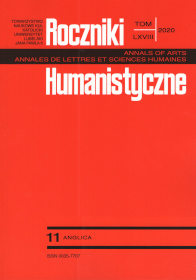The Multitudinous Sparseness of Space in Harry Thurston’s Broken Vessel
Abstract
In January and February 2000, Canadian poet-naturalist Harry Thurston (b. 1950) spent 35 days in the Sahara with a team of archaeologists conducting research at the Egyptian oasis of Dakhleh in the Western Desert. Confronted with the vastness of a territory at once foreign and familiar, he decided to respond to the experience of living in the desert with poems of haiku-like brevity he would write each day he spent on camp. The fruit of this spiritual experience was Broken Vessel (2007), a book that seeks to capture the mystery of the desert, a space that has held a century-long fascination for the human imagination. Following Tuan’s dichotomy of space vs. place, Bennett’s notion of vibrant matter, and ecocritical concepts concerning ecopoetry as place-making, this article examines Thurston’s insights into the more-than-human world embodied by the desert, based on his firsthand observations and his imaginings of the known and revealed history of the Sahara.
References
Abram, David. “Afterword: The Commonwealth of Breath.” Material Ecocriticism, edited by Serenella Iovino and Serpil Oppermann, Indiana UP, 2014, pp. 301–14.
Abram, David. Becoming Animal. An Earthly Cosmology. Vintage Books, 2010.
Abram, David. The Spell of the Sensuous. Perception and Language in a More-Than-Human World. Vintage Books, 1996.
Adamson, Joni. “Source of Life. Avatar, Amazonia, and an Ecology of Selves.” Material Ecocriticism, edited by Serenella Iovino and Serpil Oppermann, Indiana UP, 2014, pp. 253–68.
Alaimo, Stacy. “Bring Your Shovel!” Resilience: A Journal of the Environmental Humanities, vol. 1, no. 1, January 2014.
Alaimo, Stacy. Bodily Natures. Science, Environment, and the Material Self. Indiana UP, 2010.
Alaimo, Stacy. “Trans-corporeal Feminisms and the Ethical Space of Nature.” Material Feminisms, edited by Stacy Alaimo and Susan Hekman, Indiana UP, 2008, pp. 237–64.
Barad, Karen. Meeting the Universe Halfway. Quantum Physics and the Entanglement of Matter and Meaning. Duke UP, 2007.
Bennett, Jane. Vibrant Matter. A Political Ecology of Things. Duke UP, 2010.
Bristow, Tom. The Anthropocene Lyric: An Affective Geography of Poetry, Person, Place. Palgrave Pivot, 2015.
Clarke, George Elliott. “Thurston’s Offering Glorious.” The Sunday Halifax Herald, 30 April 2000.
Heidegger, Martin. Basic Writings, edited by David Farrell Krell, Routledge, 1993.
Leopold, Aldo. A Sand County Almanac: With Essays on Conservation from Round River. 1949. Ballantine, 1970.
Thurston, Harry. Broken Vessel. Thirty-five Days in the Desert. Gaspereau Press, 2007.
Thurston, Harry. “Note on Broken Vessel.” Gaspereau Press, www.gaspereau.com/bookInfo.php ?AID=0&AISBN=9781554470341. Accessed 5 Jan. 2020.
Thurston, Harry. Secrets of the Sands: The Revelations of Egypt’s Everlasting Oasis. Arcade Publishing, 2004.
Thurston, Harry. Island of the Blessed: The Secrets of Egypt’s Everlasting Oasis. Doubleday, 2003.
Sullivan, Heather I. “The Ecology of Colors. Goethe’s Materialist Optics and Ecological Posthumanism.” Material Ecocriticism, edited by Serenella Iovino and Serpil Opperman, Indiana UP, 2014, pp. 80–94.
Szabo-Jones, Lisa. “Interview of Harry Thurston.” The Goose, vol. 9, Summer 2011, pp. 80–93, www.alecc.ca/uploads/TheGoose_9_Summer_2011.pdf. Accessed 5 Jan. 2020.
Szabo-Jones, Lisa. “Dwelling.” Canadian Literature, vol. 197, Summer 2008, pp. 195–96.
Tuan, Yi-Fu. Space and Place: The Perspective of Experience. U of Minnesota P, 1977.
Tuan, Yi-Fu, and G. H. Schoff. Two Essays on a Sense of Place. Wisconsin Humanities Committee, 1988.
Tuana, Nancy. “Viscous Porosity: Witnessing Katrina.” Material Feminisms, edited by Stacy Alaimo and Susan Hekman, Indiana UP, 2008, pp. 188–213.
Copyright (c) 2020 Roczniki Humanistyczne

This work is licensed under a Creative Commons Attribution-NonCommercial-NoDerivatives 4.0 International License.





